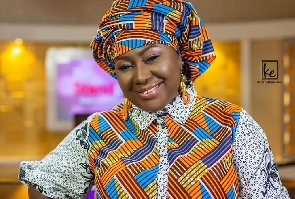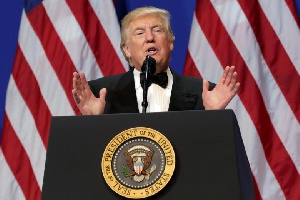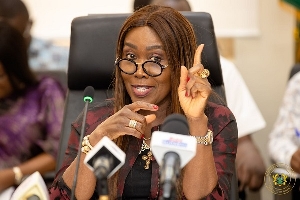- Home - News
- TWI News | TV
- Polls
- Year In Review
- News Archive
- Crime & Punishment
- Politics
- Regional
- Editorial
- Health
- Ghanaians Abroad
- Tabloid
- Africa
- Religion
- Election 2020
- Coronavirus
- News Videos | TV
- Photo Archives
- News Headlines
- Press Release
Opinions of Thursday, 14 December 2017
Columnist: Muhammad Dan Suleiman
Trump’s Jerusalem Aberration - Ghana panders to divisive global power politics again
It is almost impossible to see the logic in Donald Trump’s decision to recognise Jerusalem as the capital of Israel, argues Shibley Telhami, a Senior Fellow at the Centre for Middle East Policy.
But if Trump’s undoing of decades of U.S foreign policy stance on Jerusalem is an illogical aberration, then a statement by the Speaker of Parliament of a small West African country accepting Trump’s illogical move—contravening his own country’s so-called neutral position on the issue—is disgraceful at best.
As the speaker of Ghana’s parliament, the fact that Prof. Mike Oquaye’s comments were supposed to be his personal views does not make those comments any less naïve, unguarded and dangerous. In any serious country where national security was paramount, Prof. Oquaye would be writing his resignation letter by now, or risked being removed by his own government or parliamentary colleagues.
But as impressionable as Ghana’s Speaker of Parliament might have been on this issue, what informed his comments may be sitting deep within the social and political fabric of Ghanaian society.
Sadly, this is not the first-time Ghana has appeared to pander to the divisive politics of the 21st century, doing very little to appreciate the national security red flags involved in doing so. Here are two recent examples.
The first is Ghana’s decision in 2015/2016 to allow two former Guantanamo Bay detainees, Khalid al-Dhuby and Mahmoud Omar Bin Atef, to stay in Ghana under unusual circumstances. That move risked having—and did have? —serious consequences on Ghana’s successful but fragile Christian-Muslim relations.
This issue divided Ghana’s two major political parties. It also divided the country’s two major religious groups, with Christians mostly siding with the then opposition party which is now in government, and Muslims largely siding with the then government, now in opposition.
Besides the politics involved, there were series of public outrage and commentaries which had the potential to be detrimental to security. Then spokesperson of Ghana’s National Chief Imam is on record to have commented that the Christian Council of Ghana was “xenophobic”, and that the latter’s position on the issue was biased because of the faith of the former detainees. I am not against the acceptance of the former detainees per se.
However, any person with the right dose of national security foresight must wonder why Ghana would allow herself to be drawn into the policy mistakes of global powers, and indulge in such a dangerous collaboration with the U.S. the way it did, without realising the potential long-term consequences on security and governance.
Secondly, in what may be similar to Mike Oquaye’s comments, the current Ghana government honoured a campaign promise to institute a pilgrimage to Israel for Ghanaian Christians. Indeed, the Ghana government-supported Hajj Board oversees the annual Muslim religious requirement of pilgrimage to Makkah and Madinah in Saudi Arabia.
However, it is unclear whether a government-supported Christian pilgrimage was to recognise a mandatory religious duty in Christianity or it was just a reactive act of political pettifogging to treat Christians “fairly”—to equalise government’s support for Muslim religious duties. It appears the latter was the case since—unlike Muslims—there isn’t a mandatory religious duty for Christians to visit biblical sites as a pillar of their faith.
I have no issue with government organising pilgrimage for any religious grouping in Ghana. Indeed, I look forward to the Ghana government organising a pilgrimage for Buddhists, Hindus and traditional religionists to their sacred locations soon! It bears noting, however, that the whole logic of governments’ appropriation of religious faiths into their political machinery—Muslim or Christian—is highly problematic, given the avowed secular democratic principle of separating “Church” (or Mosque) from State. But my concern with the Christian pilgrimage is in the way it was carried out, and the potential diplomatic and security implications of same.
In the said Christian pilgrimage, the pilgrims were to visit Israel. Yet most, if not all, of the religious sites pilgrims were supposed to visit (in that so-called “Israel”) are found in territories regarded as Palestine under international law, or at least as disputed territories—a position supported by the overwhelming majority of countries within the United Nations. Going to Palestine and calling it “Israel” contravenes Ghana’s neutral stance on the Israeli-Palestinian issue.
It represents a declaration of Ghana’s support for Israel over Palestine. This amounts to a diplomatic insult to the latter. This makes the Ghana government’s statement distancing itself from Prof. Mike Oquaye’s comments merely defensive, given the government’s de facto recognition of parts of Palestine as Israel.
The decision to refer to territories legally recognised as Palestine as “Israel” also offends the overwhelming majority of the world’s people—Muslims, non-Muslims, Arabs and non-Arabs—who believe the state of Israel to be a synonym for oppression.
An oppressor state initiated by the Balfour Declaration in pursuit of a “national home for the Jewish people”. Sir Arthur Balfour’s letter dated November 2 1917 to Lord Walter Rothschild, then leader of British Jewish community, subsequently led to the declaration of the Zionist State of Israel in 1948, at a location which had hitherto been home to Palestinians for many centuries. A protracted religious-cultural feud ensued. And a war has been fought ever since.
The Palestine-Israel issue is doubtlessly the world’s longest and most sensitive conflict. But for a small African country to dance on the fringes of that conflict, even if inadvertently so, amounts to political stupidity. Worse, this political short-sightedness opens up local spaces to dangerous global ideologies to seep through.
Re-taking pre-1967, if not pre-1948, Palestine is one of the ambitions of several violent Islamist organisations across the world. Any favourable engagement with Israel—an imposter and oppressor state, according to these Islamists and according to most, if not all, Muslims—by countries as vulnerable as Ghana is a potentially perilous venture. A clear national security issue to which the Ghana government appears to be deliberately—but dangerously—oblivious.
Prof. Mike Oquaye is believed to have stated in regards to Trump’s decision: “whatever Israel wants, we in Ghana will go by that, because that is essentially an internal decision.” This statement amounted to a betrayal of Ghana’s sovereignty, in which Prof. Oquaye subverted Ghana’s own internal socio-political independence to Israel—a country which, according to many, is of questionable legitimacy.
This becomes even more serious if one thinks of the fact that Ghana’s Speaker of Parliament is the third in line to serve as president in the absence of the sitting president and vice president. Even key US allies such as Britain and Australia have clearly stated that they do not support this irresponsible trumping of peace and justice in the Middle East.
So, for Prof. Mike Oquaye, an elite Ghanaian intellectual, politician and senior citizen, to shudder before president Trump’s aberration shows how many an African elite are willing to sell the peaceful African humanity for a hegemonic pittance.
Some Christians in Ghana, including some prominent Christian preachers and opinion leaders, are jubilant over Trump’s recognition—and, perhaps, over Mike Oquaye’s immediate endorsement—of Jerusalem as Israel’s capital, much to the chagrin of many ideologically-aware Muslims. They claim Trump’s recognition is a biblical prophecy come true—a rather infantile argument given the religious and cultural complexities and contradictions in what is today Palestine.
My concern here however is, from a human security perspective, Christians’ praise of Trump’s recognition and simultaneous Muslims’ disgust of same portends doom. Indeed, there are many Christians who—in the spirit of commendable wisdom—have condemned Prof. Oquaye’s comments or stayed on the fence on the issue.
Yet, still, pandering to divisive global politics the way Ghana seems to be doing recently has direct implications for Christian-Muslim relations. As argued elsewhere, the idea that Ghana is insulated from large scale ideological conflict is a position of wishful thinking founded on destructive romantic nationalism. In a West African sub-region engulfed by violent extremist groups, a security expert is right to have made the argument that Ghana is not insulated from terrorist attacks either.
Many hitherto peaceful countries have become ungovernable due to a lack of foresight by those in charge. Indeed, Christians and Muslims in Ghana have lived side by side with impressive maturity. Yet there is much to be done to consummate these peaceful gains. The price of hasty complacency is always a long and tedious regret.
That is why political leaders in the developing world should be tactful and wiser than Prof. Mike Oquaye. Countries with significant and politically active religious-cultural populations must strive to deploy a national security policy of caution. A deliberate but measured approach in response to the intransigencies of the twenty first century.
A pragmatic policy of cultural assertiveness, founded on a robust realisation that African countries have their own unique demography and socio-political priorities. A break away from being servants of global powers and their divisive politics, to being leaders with a strong commitment to local needs and to humanity.
Entertainment










